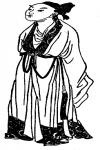Bibliography
Despite his failure in politics, Cao Zhi was hailed as one of the representatives of the poetic style of his time, together with his father Cao Cao, his elder brother Cao Pi and several other poets. Their poems formed the backbone of what was to be known as the Jian'an poetry style (建安風骨). The civil strife towards the end of the Eastern Han Dynasty gave the jian'an poems their characteristic solemn yet heart-stirring tone, while lament over the ephemerality of life was also a central theme of works from this period. In terms of the history of Chinese literature, the jian'an poems were a transition from the early folk songs into scholarly poetry.
Although jian'an refers to the time between 196 and 220, Cao Zhi's poems could in fact be categorized into two periods, with the year 220 as the watershed. The earlier period consisted of poems that expressed his ambitions. These poems were optimistic and romantic in nature. On the other hand, his setbacks in political pursuits after the death of his father in 220 gave rise to the grievous tone of his later works.
More than ninety poems by Cao Zhi remain today, more than sixty of which are five-character poems (五言詩). These are held in high esteem for their significant influence over the development of five-character poetry in later ages. The most complete collection of Cao Zhi's poems and other literary works is Chen Si Wang Ji (陳思王集, Collection of Works by King Si of Chen), compiled during the Ming Dynasty. One of Cao Zhi's most celebrated poems is On the White Horse. Written in the early years of his life, the poem portrayed a young warrior who answered fearlessly to the need of his country and reflected Cao Zhi's own aspiration to contribute to his times.






